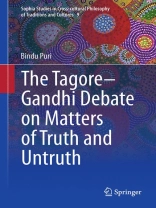Between 1915 and 1941, Tagore (1861-1941) and Gandhi (1869-1948) differed and argued about many things of personal, national, and international significance—satyagraha, non-cooperation, the boycott and burning of foreign cloth, the efficacy of fasting as a means of resistance and Gandhi’s mantra connecting “swaraj” and “charkha”. The author tracks the development of this dialogue and argues that the debate was about more fundamental issues, such as the nature of truth and swaraj/freedom and the possibilities of untruth that Tagore saw in Gandhi’s movements for truth and freedom. Puri shows that the differences between the two men’s perspectives came from differently negotiated relationships to (and understandings of) tradition and modernity. Tagore was part of the Bengal renaissance and powerfully influenced by the idea that the Enlightenment consisted in the freedom of the individual to reason for herself. Gandhi, on the other hand, remained close to the Indian philosophical tradition which linked individual freedom to moral progress. Puri points out that Tagore cannot, however, be unreflectively assimilated to the Enlightenment project of Western modernity, for he came fairly close to Gandhi in rejecting the anthropocentricism of modernity and shared Gandhi’s belief in an enchanted cosmos.
The only single-authored volume on the Tagore-Gandhi debate, this book is a welcome addition to the existing literature.
Tabla de materias
Chapter 1: The Tagore– Gandhi Debate: An Account of the Central Issues.-
Chapter 2: Of Mantras and Unquestioned Creeds: Re-constructing Gandhi’s Moral Insights.-
Chapter 3: Gandhi’s Truth: Debate, Criticism, and the Possibilities of Closure in Moral Arguments.-
Chapter 4: Tagore: On the possibilities of untruth and moral tyranny.-
Chapter 5: Understanding
Swaraj: Tagore and Gandhi.-
Chapter 6: Gandhi and Tagore: Life in an Enchanted Cosmos.
Sobre el autor
Bindu Puri is an associate professor with the Department of Philosophy, University of Delhi, Delhi, India. She has been interested in issues in political philosophy, moral philosophy, and modern Indian philosophy. She has published six books, including one monograph, entitled Gandhi and the Moral Life. She has edited Mahatma Gandhi and His Contemporaries and co-edited two volumes on the philosophy of Immanuel Kant, entitled Reason, Morality and Beauty, and Terror, Peace and Universalism, published by Oxford University Press. She has recently co-edited a special issue of IIC Quarterly on Living with Religious Diversity (April 2014). She has published about 35 articles, including book reviews, in philosophical and interdisciplinary journals of international repute, including articles in Sophia, Philosophia and the Journal of Indian Council of Philosophical Research, some of which are: The Self and the Other: Liberalism and Gandhi (Philosophia, Vol. 39[4], 2011); Freedom and the Dynamics of the Self and the “Other”: Re-constructing the Debate between Tagore and Gandhi (Sophia 52[2], 2013); and Finding Reasons for Being Reasonable: Interrogating Rawls (Sophia 2014). Professor Puri has presented many papers in national and international seminars and has delivered several invited lectures in universities in India and abroad.












